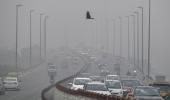The Delhi government's odd-even car rationing scheme to curb air pollution on Tuesday came under scrutiny by the Supreme Court which questioned its effectiveness and termed it "all optics".

The apex court, which was hearing a matter pertaining to debilitating air pollution in the Delhi-National Capital Region (NCR), asked the counsel for the Delhi government whether the odd-even scheme had succeeded when it was implemented earlier.
"These are all optics, this is the problem," a bench of Justices Sanjay Kishan Kaul and Sudhanshu Dhulia observed.
The court's observation came a day after the Delhi government announced its decision to implement odd-even car rationing scheme from November 13, a day after Diwali, when pollution levels are likely to shoot up even further.
The apex court is seized of a plea filed in 1985 by environmentalist M C Mehta on air pollution and the issue of crop residue burning had cropped up during the hearing of the matter.
After the hearing on Tuesday, Delhi's Environment Minister Gopal Rai said the city government will take into account the apex court's directives on pollution while finalising the odd-even car rationing scheme.
Amid a spike in air pollution in Delhi-NCR, the Supreme Court has directed Punjab, Haryana, Uttar Pradesh and Rajasthan to ensure crop residue burning was stopped "forthwith", saying it cannot let "people die" due to pollution.
The bench also directed the Delhi government to ensure that municipal solid waste was not burnt in the open.
As the city's air quality worsened, the minister had on Monday announced that the odd-even scheme will be enforced in the city from November 13 to 20.
"The odd-even scheme will come into effect in Delhi after Diwali, running from November 13 to November 20. A decision to extend the scheme will be made after November 20," the minister had told a press meet in New Delhi.
Introduced in 2016, the odd-even car rationing scheme permits cars to operate on alternate days based on their odd or even number plates. The enforcement next week would mark the fourth time that the Delhi government will implement this scheme to tackle pollution caused by vehicles.
According to a 2018 study conducted by The Energy and Resources Institute, vehicular emissions contribute roughly 40 per cent to the (particulate matter) PM 2.5 pollution in the capital.











 © 2025
© 2025